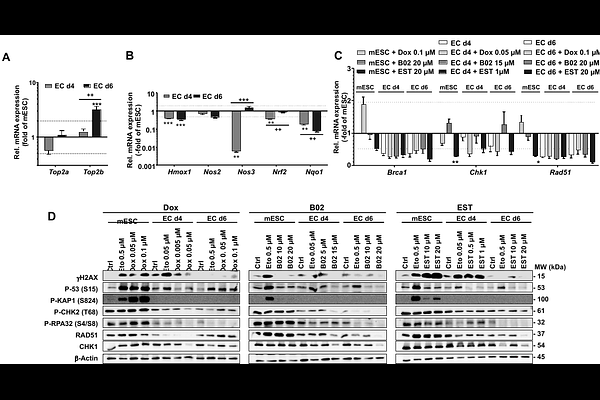Differential responses of murine embryonic stem cells (mESC) and their endothelial progeny to doxorubicin and pharmacological inhibitors of DNA repair and DNA damage response

Differential responses of murine embryonic stem cells (mESC) and their endothelial progeny to doxorubicin and pharmacological inhibitors of DNA repair and DNA damage response
Federmann, S.; Westerhoff, M.; Reichert, A. S.; Fritz, G.
AbstractThe clinical use of the anticancer drug doxorubicin (Dox) is limited by irreversible cardiotoxicity. The detailed molecular mechanisms involved and the pathophysiological relevance of different cardiac cell types, including progenitor cells, are still unclear. Here, we investigated stress responses of murine embryonic stem cells (mESC), endothelial progenitor cells (EC d4) and terminally differentiated endothelial-like cells (EC d6) following exposure to Dox and selected pharmacological inhibitors of DNA repair and DNA damage response (DDR) (RAD51i B02 and HDACi entinostat (EST)). We found that EC d4 exhibited a pronounced Dox hypersensitivity as compared to both mESC and EC d6, which was independent of drug transport. Analysis of EdU incorporation and replication fork progression following drug treatment revealed substantial agent-specific differences between mESC and the various differentiation stages. Furthermore, cellular susceptibility to drug-induced formation of DNA damage (i.e. DSB and SSB) also changes with ongoing differentiation and drug treatment, with mESC and EC d4 / EC d6 being particular prone to enhanced residual SSB and DSB levels, respectively. Dox treatment of EC d4 did not affect their differentiation into EC d6, but caused multiple functional impairments of the surviving EC d6 progeny, including defects in mitochondrial homeostasis, barrier function related to cell-cell adhesion factors ZO1 and VE-cadherin, response to cytokine stimulation as well as LDL uptake. To summarize, we show substantial differences in the response of mESC, EC d4 and EC d6 to Dox and pharmacological inhibitors of DNA repair and DDR. Most important, treatment of EC d4 results in pronounced persisting functional impairments of differentiated EC d6, pointing to a transient particularly drug-sensitive time window during endothelial differentiation. These findings are important for hazard assessment in developmental toxicology and regenerative medicine in the context of anticancer drug-induced normal tissue damage.